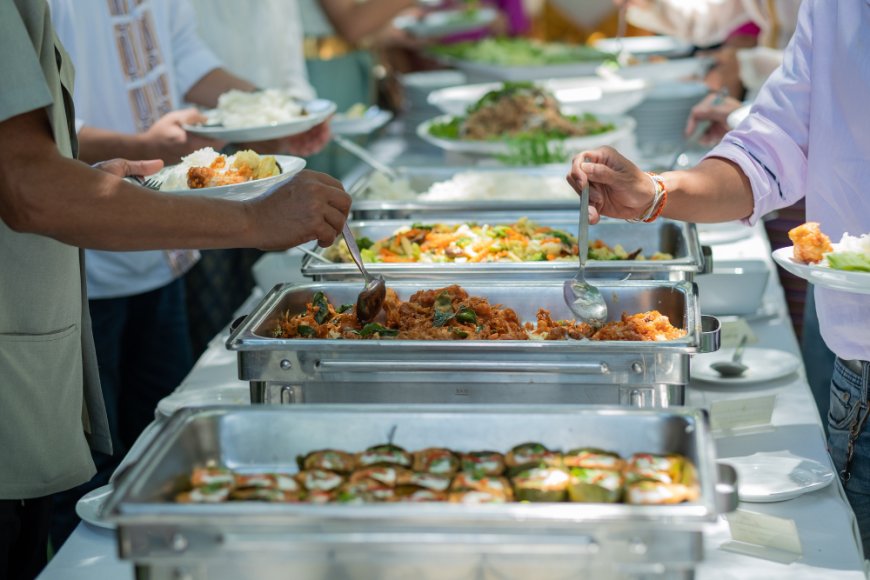Why Eco-Friendly Catering Services Are Gaining Popularity

The catering industry has witnessed a significant shift toward eco-friendly practices. This trend is not just a fleeting fad but a response to growing consumer awareness about environmental impact and sustainability. Catering services that prioritize green methods are rapidly gaining popularity, and heres why this approach is becoming the preferred choice for many events.
Growing Demand for Sustainable Catering
More consumers today are increasingly mindful of how their food choices impact the environment, and they want those choices to align with their personal values. This shift in mindset has led to a growing demand for catering services that prioritize sustainability. For instance, many eco-friendly caterers now use biodegradable or compostable packaging instead of traditional plastic containers, significantly reducing the amount of non-recyclable waste generated at events. Additionally, minimizing single-use plasticssuch as straws, cutlery, and cupshelps cut down on pollution and landfill overflow.
Another important factor is sourcing ingredients locally. By choosing produce and products from nearby farms and suppliers, catering services can reduce transportation emissions and support local economies. These combined efforts help lower the overall carbon footprint of events. As a result, clients who care deeply about the environment are more likely to select catering services that demonstrate a genuine commitment to sustainable practices, allowing them to make a positive impact through their event planning decisions.
Plant-Based and Flexitarian Menus Lead the Way
One of the most popular trends in eco-friendly catering today is the increasing popularity of plant-based and flexitarian menus. These menus emphasize vegetables, whole grains, legumes, and sustainable protein sources like beans, lentils, and plant-based meat alternatives. Compared to traditional meat dishes, these ingredients typically require significantly fewer natural resources such as water, land, and energy to produce.
This makes them a more environmentally friendly choice. Beyond sustainability, plant-forward menus offer vibrant, colorful, and flavorful options that appeal to a wide range of tastes and dietary preferences. They also cater to the growing number of health-conscious consumers who seek nutritious and balanced meals. By incorporating these menus, catering services not only support environmental goals but also provide guests with diverse and exciting food experiences. This trend reflects a broader shift in the food industry toward more responsible and mindful eating habits.
Zero-Waste and Smart Food Management
Eco-friendly catering services are increasingly embracing zero-waste strategies to tackle the significant issue of food waste. These approaches involve creatively reusing leftovers by transforming them into new dishes or ingredients, which helps maximize the use of all food prepared. Additionally, many caterers partner with local charities and food banks to donate any excess food, ensuring it benefits those in need rather than ending up in landfills. Another important tactic is the use of smart inventory management systems that accurately track supplies and consumption patterns.
This technology helps caterers avoid over-ordering and reduces the risk of spoilage. Together, these practices not only minimize the environmental impact by cutting down landfill waste but also highlight a catering services dedication to responsible and sustainable resource management. Such efforts resonate deeply with todays eco-conscious clients who value businesses that actively contribute to environmental preservation and social good.
Energy Efficiency and Sustainable Operations
Beyond just the food, eco-friendly catering also focuses on how kitchens operate behind the scenes. Many catering companies are now investing in energy-efficient appliances, such as ovens, refrigerators, and dishwashers that use less electricity and water. Alongside this, smart kitchen technologies help monitor and optimize energy use, reducing waste and improving efficiency. Some caterers even power their operations with renewable energy sources like solar or wind, further cutting down their carbon footprint.
These upgrades not only help lower operational costs over time but also significantly reduce the environmental impact of running a catering business. By adopting these sustainable practices, caterers strengthen their green credentials, making them more attractive to clients who care about sustainability at every stage of their event. This holistic approach ensures that eco-friendly values are reflected throughout the entire event lifecycle, from preparation to cleanup.
Supporting Local and Ethical Sourcing
Choosing local suppliers and ethically sourced products stands as a fundamental pillar of eco-friendly catering. By sourcing ingredients from nearby farms and producers, caterers significantly reduce transportation emissions, which are a major contributor to environmental pollution. This local approach not only lowers the carbon footprint associated with long-distance shipping but also supports sustainable farming practices that prioritize soil health, biodiversity, and responsible water use. Moreover, opting for ethically sourced products ensures fair wages and humane treatment for workers and animals involved in the supply chain.
Beyond the environmental and social benefits, local sourcing also means fresher ingredients, which translates to better taste and higher-quality dishes for guests. This combination of sustainability and superior food quality enhances the overall dining experience, making it a win-win for both the planet and event attendees. Ultimately, partnering with local and ethical suppliers reflects a catering services genuine commitment to responsible and conscious food choices.
Key Takeaway
Eco-friendly catering services are gaining popularity because they meet the evolving expectations of consumers who prioritize environmental responsibility. By embracing sustainable packaging, plant-based menus, zero-waste practices, energy-efficient operations, and local sourcing, catering businesses not only protect the planet but also create memorable, meaningful events. As sustainability continues to shape the food service industry, eco-friendly catering stands out as a smart, forward-thinking choice for any occasion.








































